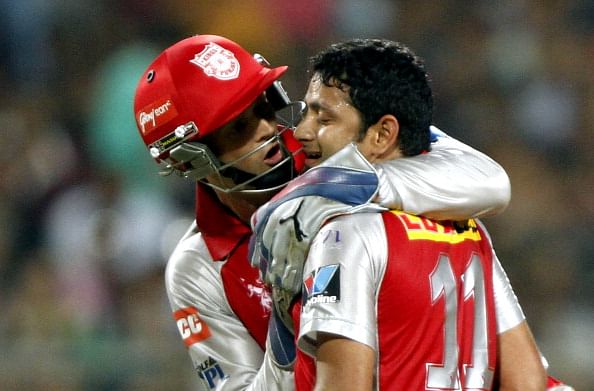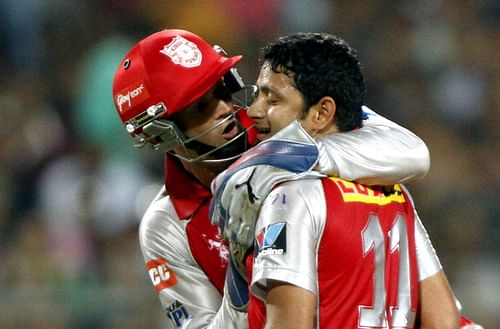
Foreign captains in the IPL - The right approach?

The Indian Premier League has started off as one of those devil-may-care leagues. Reputations have gone for a toss, and careers have been altogether reshaped. Team owners have put in their blood, sweat and tears into the making of their teams. Reputations mean nothing to these ruthless professionals – considering that there’s only one common desire engraved in their minds – victory.
Adam Gilchrist’s current run of form has been disgraceful, and that is close to the politest one can get. Scores of 4, 26, 7, 0, 9 and 15 do no justice to a man of his ability. His visibly desperate attempt to keep that smile strongly resembles the face of an embarrassed puppy, unable to find the ball it was supposed to fetch. In a team where only four foreign players are allowed, Gilchrist is, quite frankly, wasting a spot. The fact that he leads the side further complicates the situation. Can he be dropped? Or, in euphemistic terms, “rested”?
Dropping a player from the eleven is no big deal. Dropping a captain, however, is a whole new ball game. Dropping a captain would force a team to thoroughly change their team dynamics. Dropping a captain would garner more controversy than the team can handle. After all, a captain is expected to be good enough to command a place in the team with effortless ease. A captain is expected not to have even the slightest hint of a question mark anywhere near the vicinity of his name.
Only four of eleven spots are reserved for foreigners. Assuming that the captain plays all matches, isn’t one spot just unnecessarily blocked if the skipper is a foreigner? Doesn’t the composition and flexibility of the team suffer needlessly?
This season, Ricky Ponting has hitherto done nothing of worth. Mahela Jayawardene has been uncharacteristically inconsistent. Angelo Mathews has looked like an ordinary mortal in a league of superstar skippers. Adam Gilchrist’s captaincy has been uninspiring, and his batting, disappointing. Kumar Sangakkara dropped himself from the Sunrisers eleven following a string of below par performances. Well, not everyone has the grace of a Sangakkara.
Okay, let us assume the captain is in the form of his life. Let us assume that there are no doubts shadowing the captain’s place in the eleven. Still, can a foreign skipper get through to the local Indian talent even half as comfortably as any Indian would? Let alone being able to understand and utilize their abilities to the fullest, it is highly unlikely that Angelo Mathews would have been able to remember who was Udit Birla and who was Krishnakant Upadhyay for the first few days. On the other hand, an Indian captain would have much better knowledge about the strengths and weaknesses of the domestic players. He would know exactly whom to trust in which situation, and would, almost certainly, be placed in a better position in communicating with the local recruits of the squad.
“The single biggest problem about communication, is the illusion that it has taken place”, said George Bernard Shaw. And that, arguably, is precisely what plagues every IPL franchise deciding to go ahead with a foreign skipper. Irrespective of all the brotherhood that the IPL claims to have brought about amongst players, the hard truth is that all that brotherhood is reserved only for the supposedly more “elite” individuals – those fluent in English.
Every match, prior to the Mumbai Indians walking out to field, Ricky Ponting unfailingly delivers his traditional, quintessential, famously motivational speech. Rahul Dravid does the same before the Royals step out. The difference? Each and every player undoubtedly understands what Dravid says. And almost certainly, hangs onto his every word. On the other hand, Javed Khan and Abu Nechim hop around from player to player, in a desperate manhunt for that elusive language-and-accent decoder in the Mumbai Indians’ camp.
We already know that translation isn’t really the best idea. Promising careers have been ruined due to the ugly head of communication issues rearing up. Take, for instance, poor Dodda Ganesh. He realised the hard way that being in the Indian dressing room and not knowing Hindi is a punishable offence! As per reports, Sachin Tendulkar, the Indian captain at the time, struggled to get his points across to Dodda Ganesh, who only knew Kannada. When Ganesh bowled, Kumble was forced to play the role of interpreter. The thorough lack of direct communication led to Ganesh’s downfall; it led to his career spiralling downhill at the rate of knots. And now, Ganesh must be sitting at home watching the IPL, and contemplating a career that could have been.
Clearly, direct one-to-one communication with the captain is an absolute must. It improves individual performances, thus bettering that of the team. That is a box only an Indian captain can check. After all, a captain has to motivate; he has to inspire. A captain must have the inherent capacity of inculcating self-belief in each and every member of the squad. Actions may speak louder than words, but downplaying the importance of words may just be the biggest mistake a captain can make. And so, a foreign captain would probably end up spending more time in finding ways and means to get around the language barrier rather than on strategies to beat the opposition.
It is almost glaringly obvious that having a foreign captain has more cons than pros. Five of the nine franchises opted for a foreign captain over an Indian. However, the most consistent teams of the world’s richest league – Chennai Super Kings and the Royal Challengers Bangalore – are led by Indians. Obviously, it is no coincidence.